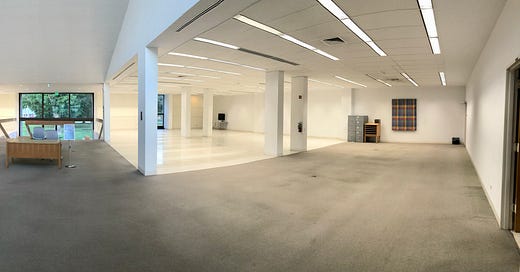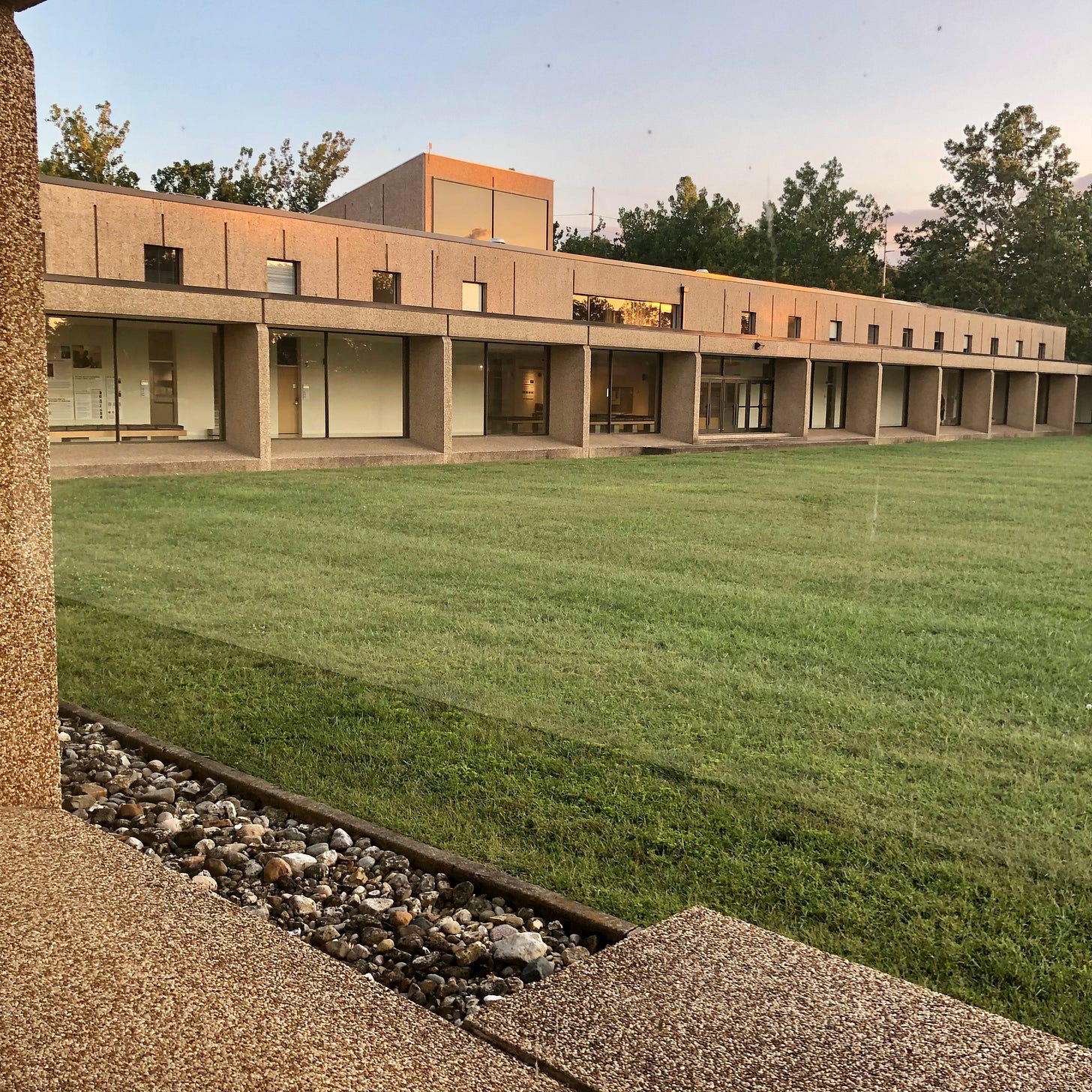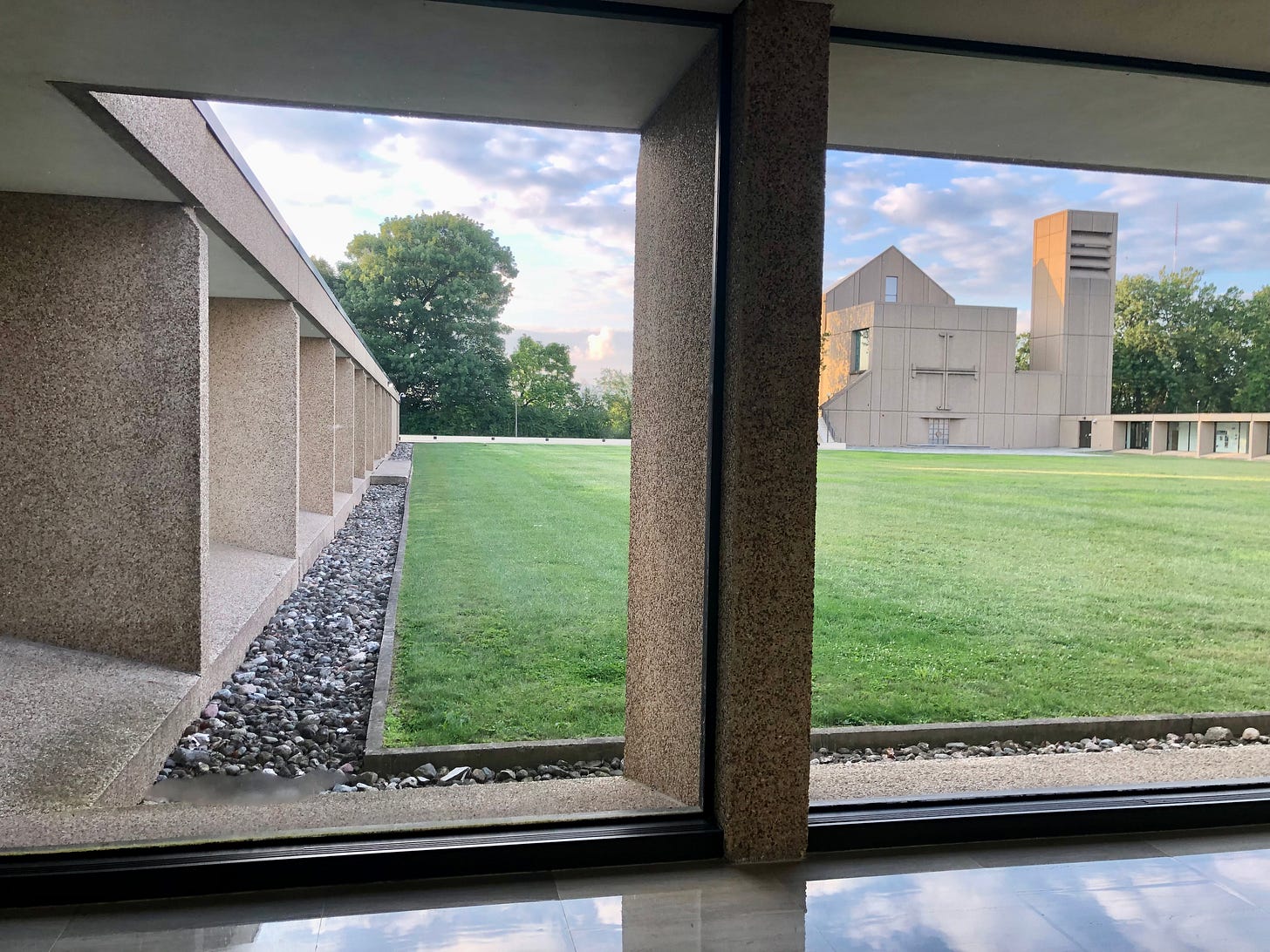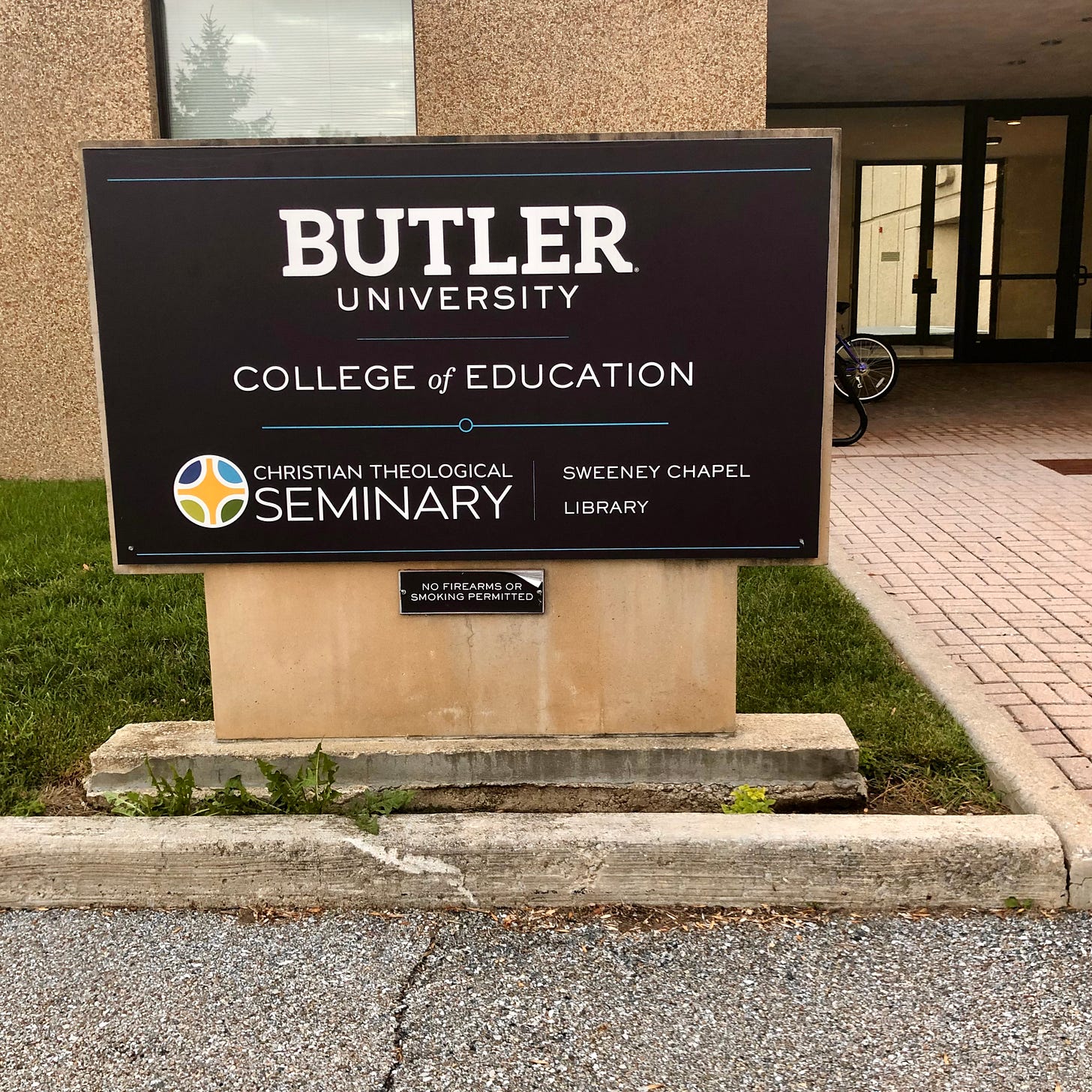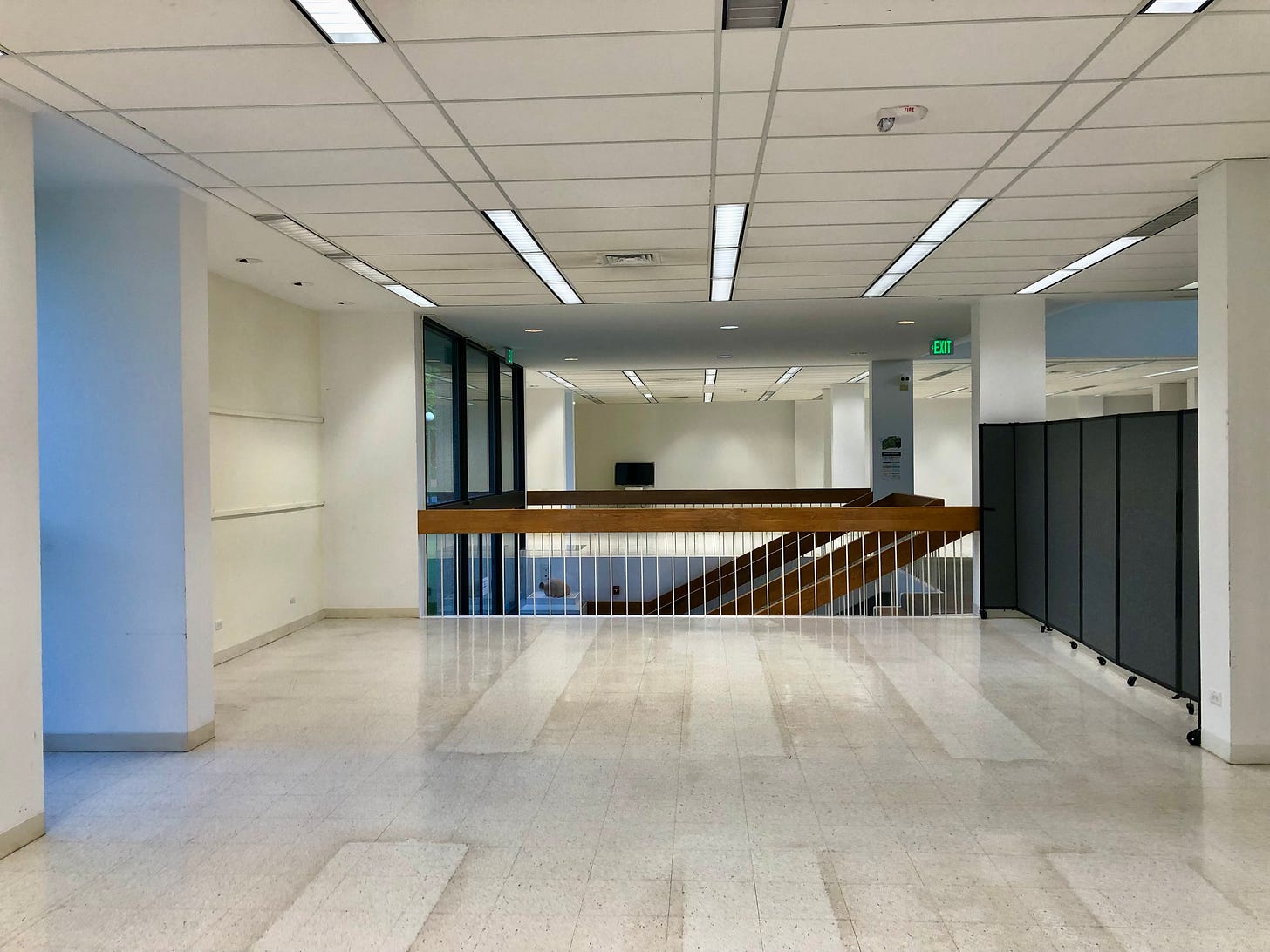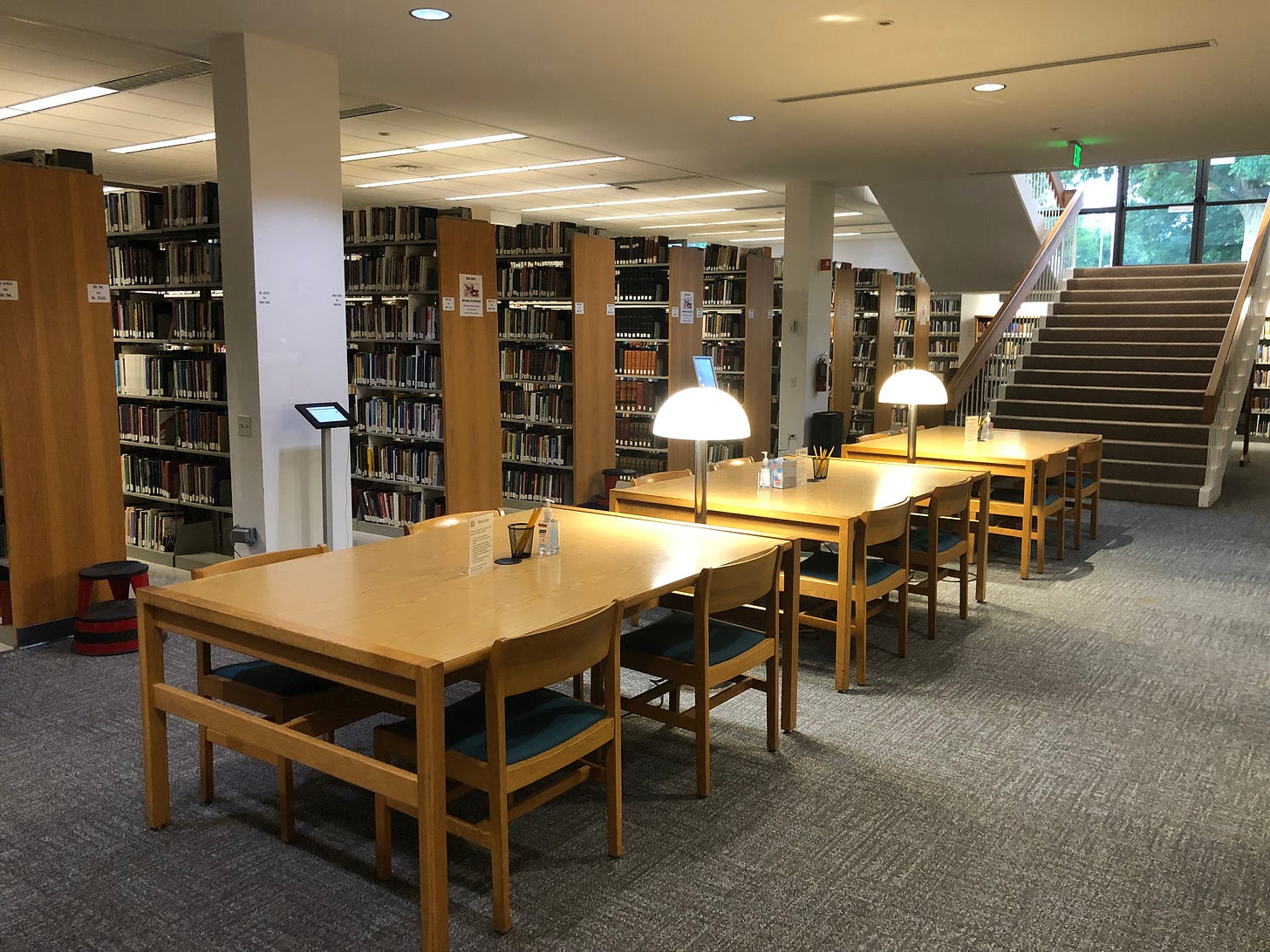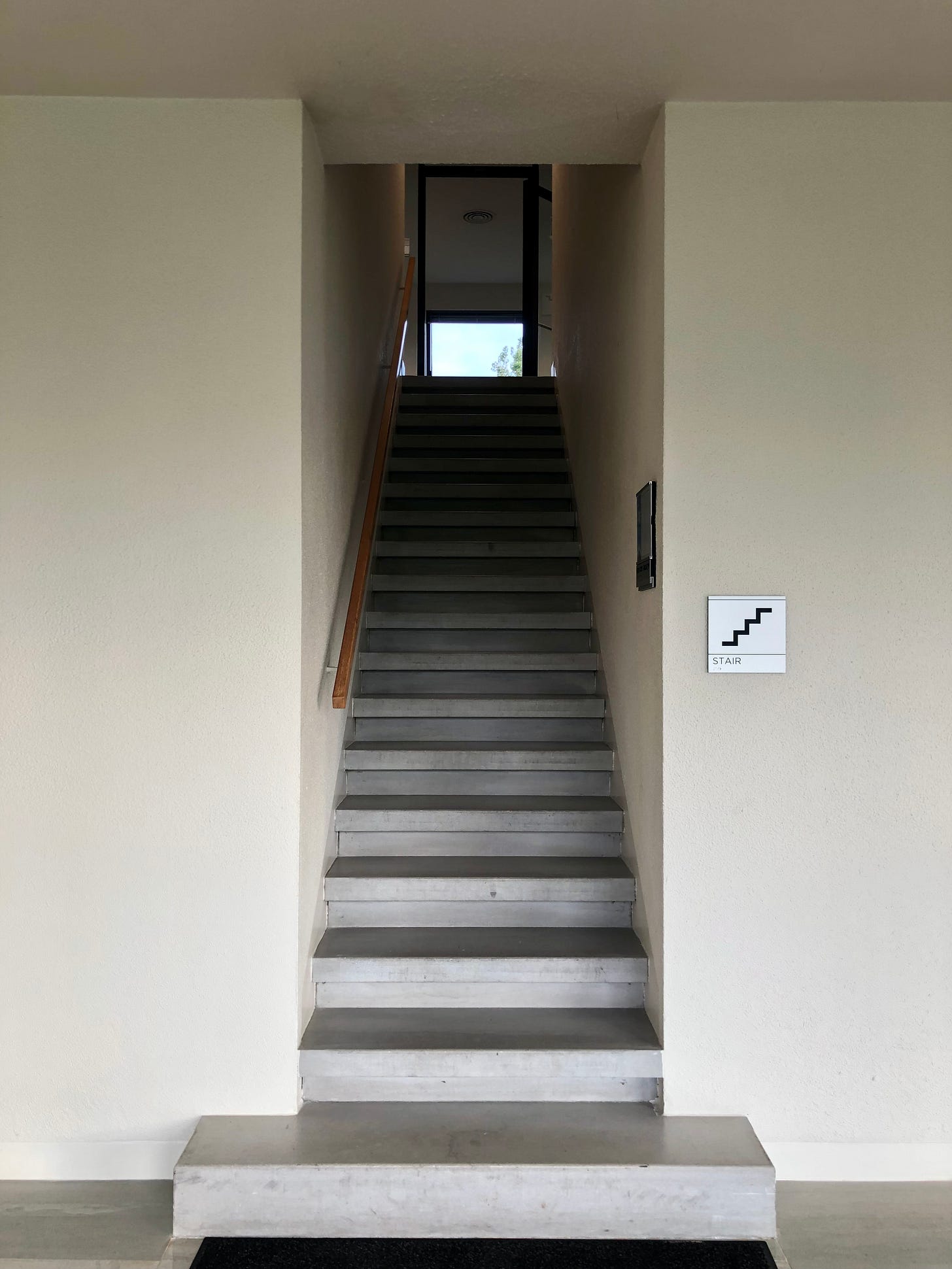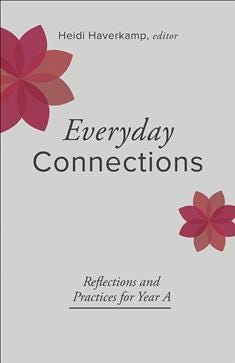A Big Empty Room and the Holy Spirit
Last month, I tried to visit the library at the local mainline seminary. When I walked in . . . the room was empty. No books. No shelves. All gone!
But I quickly figured out the the library had not disappeared. A sign invited me to walk downstairs, back towards those windows in the photo, to where the library was now living, on the basement level.
But that empty room. . . it stuck with me.
Christian Theological Seminary and Butler University are the descendants of an abolitionist school for ministers founded in Indianapolis in 1855. A hundred years later, in 1958, CTS became an independent institution and built a brand new, sprawling, modernist campus adjacent to Butler.
The American church in that decade was like nothing this country had ever seen, as membership and worship attendance skyrocketed after World War II and churches of all denominations scrambled to make room for all the people (and children) coming through the doors. “Church” was a broadly unquestioned, respected part of American life on civic and personal levels, for better and for worse. This lasted about two decades. (The evangelical movement is a different story, but it is now shrinking, too.)
The campus at Christian Theological Seminary was built for that world. It is open, confident, unafraid. The architecture is almost Brutalist in style - gigantic blocky buildings made out of an astonishing amount of concrete, built with straight lines, flat surfaces, and gigantic, simple, geometric shapes. The interior courtyard is a vast swath of green lawn. The chapel is a plain but imposing block tower, rooted in a hillside that slopes down to the river. The campus is full of natural light and open space.
That day, hunting for the books I wanted, I was moved by how beautiful it all was. I love modern architecture. I loved the simplicity, openness, and confidence. But it was mostly vacant - classes hadn’t started yet. There were two cleaners mopping the stone floors who smiled and waved to me.
Of course, like most of our mainline churches and seminaries, CTS has been shrinking since the 1950s. In 2017, it finally sold most of its land and buildings to Butler and now leases back the space it needs. Butler’s Education Department shares the campus with the seminary.
Here’s the truth – empty churches and seminaries will become more and more common. And not just for mainline churches. The world the church has known - where belief and spirituality are primarily found within a solid, institutional presence - is shifting. Emptying out, we might say.
The thing is, I am tempted to focus on the shadows behind — to obsess over this empty library space — and forget to let go and look ahead to what the Holy Spirit is doing next.
I can tell myself a sad story — that a storehouse of spiritual knowledge has been discarded, relinquished into an underground room that is dark and hard to find.
Or I could tell a different story, that we are like early Christians who worshipped in quiet anonymity in the catacombs, or like the desert fathers and mothers who sought God out in the desert. Or, as one writer said in a recent podcast, that we are living a story that is quite similar to our beginnings: a minority that is speaking into a world that might not understand what we’re talking about.
What story are we telling in our churches, these days?
Letting go of the old is not easy, but it makes room in us to focus on encountering the living God instead of focusing so much on keeping an institution going. Usually, sadly, we would rather hold onto what we know, even if it is making us tired. Very, very tired, even. I worry we focus on peopling committees, duties, and programs at the expense of seeking to experience the presence of God - whether it’s in prayer, worship, Bible study, service to others, fellowship, or whatever. The institution can take all the bandwidth, and so, we get tired instead of fed.
For instance, I keep hearing — from my directees, from my dad, and in church newsletters I subscribe to (I’m a weirdo that likes to read church newsletters) — about the struggle to recruit volunteers to host coffee hour. If there is no energy in a congregation to host coffee hour, is the Spirit inviting the congregation to let it go? To take a risk and see what happens? Instead of spending energy struggling to keep coffee hour going, maybe God is inviting us to see something else.
We cannot force a lively church life into existence. Maybe it can only happen by accident? We can only thrive in what the Spirit gives us energy to do. What Howard Thurman says is true:
Don't ask what the church needs. Ask what makes you come alive, and go do it. Because what the church needs is more people who have come alive. (“world” changed to “church,” here.)
The shrinking of the Church That Was doesn’t have to be a story with an unhappy ending. We are always invited to seek to encounter the love and presence of Christ among us. God is always with us, even in places that seem empty. Maybe, even more so then.
WHAT I’M READING
Churches and the Crisis of Decline — by Andrew Root (2022). This book very much informed this letter. Here’s what my friend Katherine Pershey wrote in her review for The Christian Century: “Root is not primarily concerned with the crisis churches think they’re having, which is a lack of resources and relevance. He identifies a far more critical crisis than underfunded budgets and empty pews: we are fallible human beings encased in an immanent frame all but incapable of recognizing or responding to the living God, the “God who is God.”
Search — by Michele Huneven (2021). A novel about a church search committee’s chaotic-if-well-meaning pastor search. Doesn’t condemn church life but reveals its quirks and wonders and foibles, with humor. The ending is hard one - be warned. Maybe don’t read this if you’re on a search committee right now? I love reading fiction about a world I know so well - also learning a thing or two about Unitarian Universalists.
OTHER NOTES
My latest book is out . . . Hooray! Everyday Connections: Reflections and Practices for Year A — "What a rich devotional! Scripture—beribboned with trenchant questions, goading insights, invitations to sit, to pray, to write. Invitations to read Zora Neale Hurston and W. H. Auden. Yes, please!” -Lauren F. Winner, author of Wearing God
Want a free signed bookplate? (Or two?) Come on down and fill out this form on my website.
Meditation and some Buddhism — Lately, I’ve been finding a lot of life and liveliness in practicing insight meditation and studying Buddhism, especially the writings of Thich Nhat Hanh, Jack Kornfield, and a fellow writer, Natalie Goldberg. It helps me feels closer to God, honestly. I did a seven-day silent retreat in July with Tri-State Dharma that was truly amazing. (My friend Kristin says “Tri State Dharma” sounds like something in a Parks and Recreation episode. Ha!)
The Queen — Queen Elizabeth died yesterday. I have no patience for any glorification whatsoever of the horrors of the British Empire, but the witness of this human being who gave her life away to live as a symbol and instrument of service to other people, without having any choice in the matter, is a wonder to me. Nobody lives like that anymore. Who gives up their dreams and personhood in service to a political entity? Nobody. Who does the same job for 86 years (since she was 10, when her father became king)? Nobody. Who swallows their identity, opinions, complaints, and personal quirks in order to be a symbol for other people? Maybe Miss America, but only for a year. Maybe pastors? Not really. Westerners don’t admire self-sacrifice much anymore, and for good reason. But. Elizabeth II makes me think again about the value of old-fashioned qualities I mostly disdain.
New here? Want to know more? For more about me, my other books (Advent is coming…), spiritual direction, and other things I’ve written, check out my website.
Until next time, my friends.
Heidi
